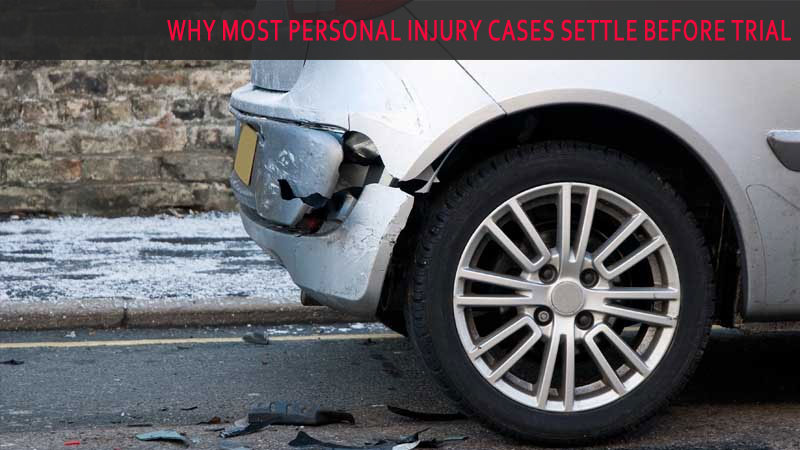Why Most Personal Injury Cases Settle Before Trial
 According to one estimate, there are over 2.35 million automobile collisions that cause an injury every year in the United States. Most of these result in the filing of an injury claim with an insurance company. Yet the vast majority of these claims are settled before a lawsuit is filed, and over 90% of lawsuits settle before trial. Why?
According to one estimate, there are over 2.35 million automobile collisions that cause an injury every year in the United States. Most of these result in the filing of an injury claim with an insurance company. Yet the vast majority of these claims are settled before a lawsuit is filed, and over 90% of lawsuits settle before trial. Why?
1. Insurance companies push hard to settle claims early.
If you are injured in a car crash and file a claim with the other driver’s insurance company, and the company recognizes that its driver is clearly at fault, the insurance company will probably try to settle the claim with you before you hire a Baltimore personal injury lawyer. Insurance companies have a financial incentive to settle your claim before you rack up a lot of medical expenses. So if you are in a crash, don’t be surprised when an insurance adjuster offers you $500 to settle the claim before you’ve even been checked out by a doctor. (And you know how little $500 buys in terms of medical treatment.) Why? Because in order to get the $500, you have to sign a document called a release. The release says that you cannot sue the driver who caused the crash, and prevents you from recovering a penny more in the future even if your injury gets dramatically worse. This is one reason why it is important to hire a lawyer to represent you when you’ve been injured in an automobile crash. A good lawyer will not let you be taken advantage of by an insurance company looking to settle your case on the cheap.
2. Trial is expensive.
It costs money to go to trial. In many cases, the injured party (called “the plaintiff” in a lawsuit) must hire a doctor to testify that the plaintiff’s injuries were caused by the car collision or dog bite or slip and fall that led to the lawsuit. Doctors aren’t cheap. Sometimes the plaintiff also has to hire so-called experts to explain how the defendant’s conduct was negligent. For example, the plaintiff might need to hire an engineer to testify that his deck collapsed because a contractor used improper hardware to secure it to the home. In another case, a plaintiff might need an expert to explain that he was injured because the manufacturer of a product knew the product was dangerous but sold it anyway. These experts cost a lot of money. Most personal injury lawyers pay these expenses up front, and then are reimbursed from the amount that the plaintiff recovers at trial. A plaintiff’s lawyer should be willing to have a candid conversation with his client about the likelihood that going to trial will result in the plaintiff receiving more money after these expenses are deducted than he would get if he settled before trial.
3. Trial is difficult.
Putting on a trial is similar to producing a movie. It takes a dedicated lawyer to prepare the case, arrange for all of the witnesses to be in the right place at the right time, design and produce the visual exhibits that will be shown to the judge and jury, and make sure the plaintiff is prepared to testify. Many lawyers simply aren’t very good at this, and are therefore reluctant to go to trial. Good lawyers are willing to go to trial, provided they have a good case. Trial is also difficult for plaintiffs. Most people do not enjoy getting on the stand, taking an oath, and testifying in front of a room full of strangers. Many plaintiffs would prefer to take less money for their claim if it means they avoid going through trial. A good lawyer should be willing to spend as much time with you as it takes to make sure you are prepared to testify comfortably.
4. Lawyers and insurance companies are fairly good at predicting the value of cases.
Insurance companies and good lawyers have seen many cases and have access to jury verdict data in similar cases. Armed with that information, coupled with their assessment of the credibility of the witnesses who will testify and how dramatic the injury is, good lawyers on both sides can predict with some certainty the range of possible verdicts in a given case. They aren’t always right, but they’re right often enough that they can have some confidence in the outcome before trial occurs. This allows the parties to work toward a settlement that makes sense for all involved.
With that said, if a lawyer is 80% sure that a case is worth a certain amount, that means he thinks there is a 20% chance that he will be totally wrong. It is this risk, along with the expense and difficulty of trial that lead to most settlements of cases in which a lawsuit has already been filed. To paraphrase Kenny Rogers, good lawyers know when to hold ‘em, and know when to fold ‘em, and will advise his client accordingly. Taking all of this on by yourself can be very difficult. That is why it is important to hire a lawyer to handle your personal injury case for you. Put your trust in an experienced lawyer who has made these decisions before.
Thanks to our friends and contributors at Greenberg Law Offices for their insight into personal injury practice.